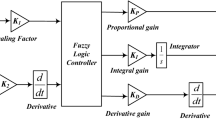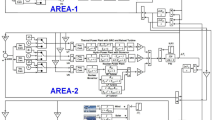Abstract
Quickly getting back the synchronism of a disturbed interconnected multi area power system due to variations in loading condition is recognized as prominent issue related to automatic generation control (AGC). In this regard, AGC system based on fuzzy logic, i.e., so-called FLAGC can introduce an effectual performance to suppress the dynamic oscillations of tie-line power exchanges and frequency in multi-area interconnected power system. Apart from that, simultaneous coordination scheme based on particle swarm optimization (PSO) along with real coded genetic algorithm (RCGA) is suggested to coordinate FLAGCs of the all areas. To clarify the high efficiency of aforementioned strategy, two different interconnected multi area power systems, i.e., three-area hydro-thermal power system and five-area thermal power system have been taken into account for relevant studies. The potency of this strategy has been thoroughly dealt with by considering the step load perturbation (SLP) in both the under study power systems. To sum up, the simulation results have plainly revealed dynamic performance of FLAGC as compared with conventional AGC (CAGC) in each power system in order to damp out the power system oscillations.
Similar content being viewed by others
Explore related subjects
Discover the latest articles, news and stories from top researchers in related subjects.References
A. Kazemi, M. R. J. Motlagh, A. H. Naghshbandy. Application of a new multi-variable feedback linearization method for improvement of power systems transient stability. International Journal of Electrical Power and Energy Systems, vol. 29, no. 4, pp. 322–328, 2007.
S. Ahmadi, H. Bevrani, S. Shokoohi, E. Hasanii. An improved droop control for simultaneous voltage and frequency regulation in an AC microgrid using fuzzy logic. In Proceedings of the 23rd Iranian Conference on Electrical Engineering, IEEE, Tehran, Iran, pp. 1486–1491, 2015.
D. P. Iracleous, A. T. Alexandridis. A multi-task automatic generation control for power regulation. Electric Power Systems Research, vol. 73, no. 3, pp. 275–285, 2005.
W. Tan, Z. Xu. Robust analysis and design of load frequency controller for power systems. Electric Power Systems Research, vol. 79, no. 5, pp. 846–853, 2009.
A. D. Falehi, M. Rostami, A. Doroudi, A. Ashrafian. Optimization and coordination of SVC-based supplementary controllers and PSSs to improve power system stability using a genetic algorithm. Turkish Journal of Electrical Engineering and Computer Sciences, vol. 20, no. 5, pp. 639–654, 2012.
P. Kundur, M. Klein, G. J. Rogers, M. S. Zywno. Application of power system stabilizers for enhancement of overall system stability. IEEE Transactions on Power Systems, vol. 4, no. 2, pp. 614–626, 1989.
Y. G. Rebours, D. S. Kirschen, M. Trotignon, S. Rossignol. A survey of frequency and voltage control ancillary services–Part I: Technical features. IEEE Transactions on Power Systems, vol. 22, no. 1, pp. 350–357, 2007.
S. Selvakumaran, V. Rajasekaran, R. Karthigaive. Genetic algorithm tuned IP controller for Load Frequency Control of interconnected power systems with HVDC links. Archives of Electrical Engineering, vol. 63, no. 2, pp. 161–175, 2014.
I. Pan, S. Das. Fractional-order load-frequency control of interconnected power systems using chaotic multi-objective optimization. Applied Soft Computing, vol. 29, pp. 328–344, 2015.
X. Li, X. P. Zhao, J. Chen. Controller design for electric power steering system using T-S fuzzy model approach. International Journal of Automation and Computing, vol.6, no. 2, pp. 198–203, 2009.
H. A. Yousef, M. Hamdy. Observer-based adaptive fuzzy control for a class of nonlinear time-delay systems. International Journal of Automation and Computing, vol. 10, vol. 4, pp. 275–280, 2013.
H. G. Guo, B. J. Zhang. Observer-based variable universe adaptive fuzzy controller without additional dynamic order. International Journal of Automation and Computing, vol. 11, no. 4, pp. 418–425, 2014.
P. S. Rao, I. Sen. Robust pole placement stabilizer design using linear matrix inequalities. IEEE Transactions on Power Systems, vol. 15, no. 1, pp. 313–319, 2000.
M. A. Abido. Pole placement technique for PSS and TCSCbased stabilizer design using simulated annealing. International Journal of Electrical Power and Energy Systems, vol. 22, no. 8, pp. 543–554, 2000.
B. C. Pal. Robust pole placement versus root-locus approach in the context of damping interarea oscillations in power systems. IEE Proceedings-Generation, Transmission and Distribution, vol. 149, no. 6, pp. 739–745, 2002.
L. Rouco, F. L. Pagola. An eigenvalue sensitivity approach to location and controller design of controllable series capacitors for damping power system oscillations. IEEE Transactions on Power Systems, vol. 12, no. 4, pp. 1660–1666, 1997.
M. E. Aboul-Ela, A. A. Sallam, J. D. McCalley, A. A. Fouad. Damping controller design for power system oscillations using global signals. IEEE Transactions on Power Systems, vol. 11, no. 2, pp. 767–773, 1996.
S. Panda, N. P. Padhy. Optimal location and controller design of STATCOM for power system stability improvement using PSO. Journal of the Franklin Institute, vol. 345, no. 2, pp. 166–181, 2008.
R. L. Haupt, S. E. Haupt. Practical Genetic Algorithms, 2nd ed., New York, USA: Wiley, 2004.
A. M. El-Zonkoly, A. A. Khalil, N. M. Ahmied. Optimal tunning of lead-lag and fuzzy logic power system stabilizers using particle swarm optimization. Expert Systems with Applications, vol. 36, no. 2, pp. 2097–2106, 2009.
A. D. Falehi, M. Rostami. A robust approach based on RCGA-optimization technique to enhance power system stability by coordinated design of PSS and AVR. International Review of Electrical Engineering, vol. 6, no. 1, pp. 371–378, 2011.
H. Shayeghi, A. Safari, H. A. Shayanfar. PSS and TCSC damping controller coordinated design using PSO in multimachine power system. Energy Conversion and Management, vol. 51, no. 12, pp. 2930–2937, 2010.
Q. Gu, A. Pandey, S. K. Starrett. Fuzzy logic control schemes for static VAR compensator to control system damping using global signal. Electric Power Systems Research, vol. 67, no. 2, pp. 115–122, 2003.
O. I. Elgerd, C. E. Fosha. Optimum megawatt-frequency control of multiarea electric energy systems. IEEE Transactions on Power Apparatus and Systems, vol.PAS-89, no. 4, pp. 556–563, 1970.
A. Khodabakhshian, R. Hooshmand. A new PID controller design for automatic generation control of hydro power systems. International Journal of Electrical Power and Energy Systems, vol. 32, no. 5, pp. 375–382, 2010.
W. Tan. Tuning of PID load frequency controller for power systems. Energy Conversion and Management, vol. 50, no. 6, pp. 1465–1472, 2009.
J. Kennedy, R. Eberhart. Particle swarm optimization. In Proceedings of the IEEE International Conference on Neural Networks, IEEE, Perth, USA, pp. 1942–1948, 1995.
J. Kennedy, R. C. Eberhart, Y. H. Shi. Swarm Intelligence, San Francisco, USA: Morgan Kaufmann Publishers, 2001.
S. Shojaeian, E. S. Naeeni, M. Dolatshahi, H. Khani. A PSO-DP based method to determination of the optimal number, location, and size of FACTS devices in power systems. Advances in Electrical and Computer Engineering, vol. 14, no. 1, pp. 109–114, 2014.
A. D. Falehi, M. Rostami, H. Mehrjardi. Transient stability analysis of power system by coordinated PSS-AVR design based on PSO technique. Engineering, vol. 3, pp. 478–484, 2011.
L. C. Saikia, J. Nanda, S. Mishra. Performance comparison of several classical controllers in AGC for multi-area interconnected thermal system. International Journal of Electrical Power and Energy Systems, vol. 33, no. 3, pp. 394–401, 2011.
K. C. Divya, P. S. Nagendra Rao. A simulation model for AGC studies of hydro-hydro systems. International Journal of Electrical Power and Energy Systems, vol. 27, no. 5–6, pp. 335–342, 2005.
S. P. Ghoshal. Optimizations of PID gains by particle swarm optimizations in fuzzy based automatic generation control. Electric Power Systems Research, vol. 72, no. 3, pp. 203–212, 2004.
P. Kundur. Power System Stability and Control, New York, USA: McGraw-Hill, 1994.
A. D. Falehi, M. Rostami. Design and analysis of a novel dual-input PSS for damping of power system oscillations employing RCGA-optimization technique. International Review of Electrical Engineering, vol. 6, no. 2, pp. 938–945, 2011.
Author information
Authors and Affiliations
Corresponding author
Additional information
Recommended by Associate Editor Giuliano Premier
Ali Darvish Falehi received the M. Sc. degree from the Shahed University, Iran in 2010. He is currently a Ph.D. degree candidate at Shahid Beheshti University, Iran. He has published more than 10 ISI papers like IET Generation, Transmission & Distribution, SPRINGER Frontiers of Information Technology & Electronic Engineering, Journal of Intelligent and Fuzzy Systems and Turkish Journal of Electrical Engineering and Computer Sciences.
His interests include FACTS, D-FACTS, power system stability, power quality, artificial intelligence and controller design.
Rights and permissions
About this article
Cite this article
Falehi, A.D. Optimal design of fuzzy-AGC based on PSO & RCGA to improve dynamic stability of interconnected multi area power systems. Int. J. Autom. Comput. 17, 599–609 (2020). https://doi.org/10.1007/s11633-017-1064-0
Received:
Accepted:
Published:
Issue Date:
DOI: https://doi.org/10.1007/s11633-017-1064-0




